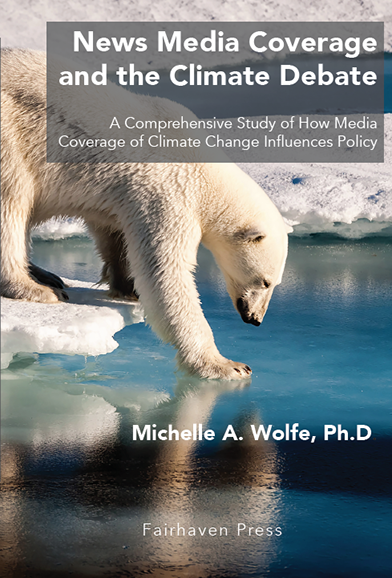
Purchase Below:
News Media Coverage and the Climate Debate:
A Comprehensive Study of How Media Coverage of Climate Change Influences Policy
Dr. Michelle A. Wolfe
Paperback
978-1-62992-026-9
$16.95
6.14x9.21"
286 pages, B&W
Aug 2017
News Media Coverage &
The Climate Debate
This book is the most comprehensive study undertaken about climate change coverage in the news media and how this coverage (or lack thereof) influences political policy. It is a technical academic book.
News coverage of climate change structures policy debates to examine its role in slowing down the momentum for large-scale policy change, such as cap-and-trade legislation. I present a theory of media signaling in what I call the “muddled space” of policy debates on complex problems, and apply it to the issue, climate change. I argue that there is a dual role for media influence in the muddled space: it prioritizes attention to policy problems, but also limits the comprehensiveness of solutions used to fix them.. On problem expansion, findings suggest that two aspects of news coverage – attribute diversity and volume – amplify problem uncertainty in policy debates and heighten disputes over its severity and are thus important factors in prioritizing the climate problem. Causal uncertainty in news coverage – doubt about the linkages among human actions, global warming, and climate impacts – makes it less likely that the climate problem will be on the policy agenda. But once it is on the agenda, causal uncertainty seems to mobilize policy brokers around strategies to define the climate problem and delineate its solutions. On solution containment, findings suggest that high levels of causal uncertainty is a limiting factor for the generation of large-scale climate solutions, such as cap-and-trade. I also find that attribute diversity and causal uncertainty in news coverage play an important role in increasing the likelihood that policy debates on climate solutions will converge around incremental approaches to fixing it, such as energy efficiency measures. This study is important because it demonstrates that the influence of news coverage on public affairs is quite large in its ability to moderate attention to policy problems and their attendant solutions. The “muddled space” helps explain why complex problems get “stuck” in cycles of policy debates over problem definitions, which leads to less effective solutions employed to solve them. Finally, this study also helps explain why the US is such a laggard in terms of climate policy.
The author of this book was tragically killed by lightning after approving the draft but before going to press. Profits from this title will be donated to an environmental charity in her name.